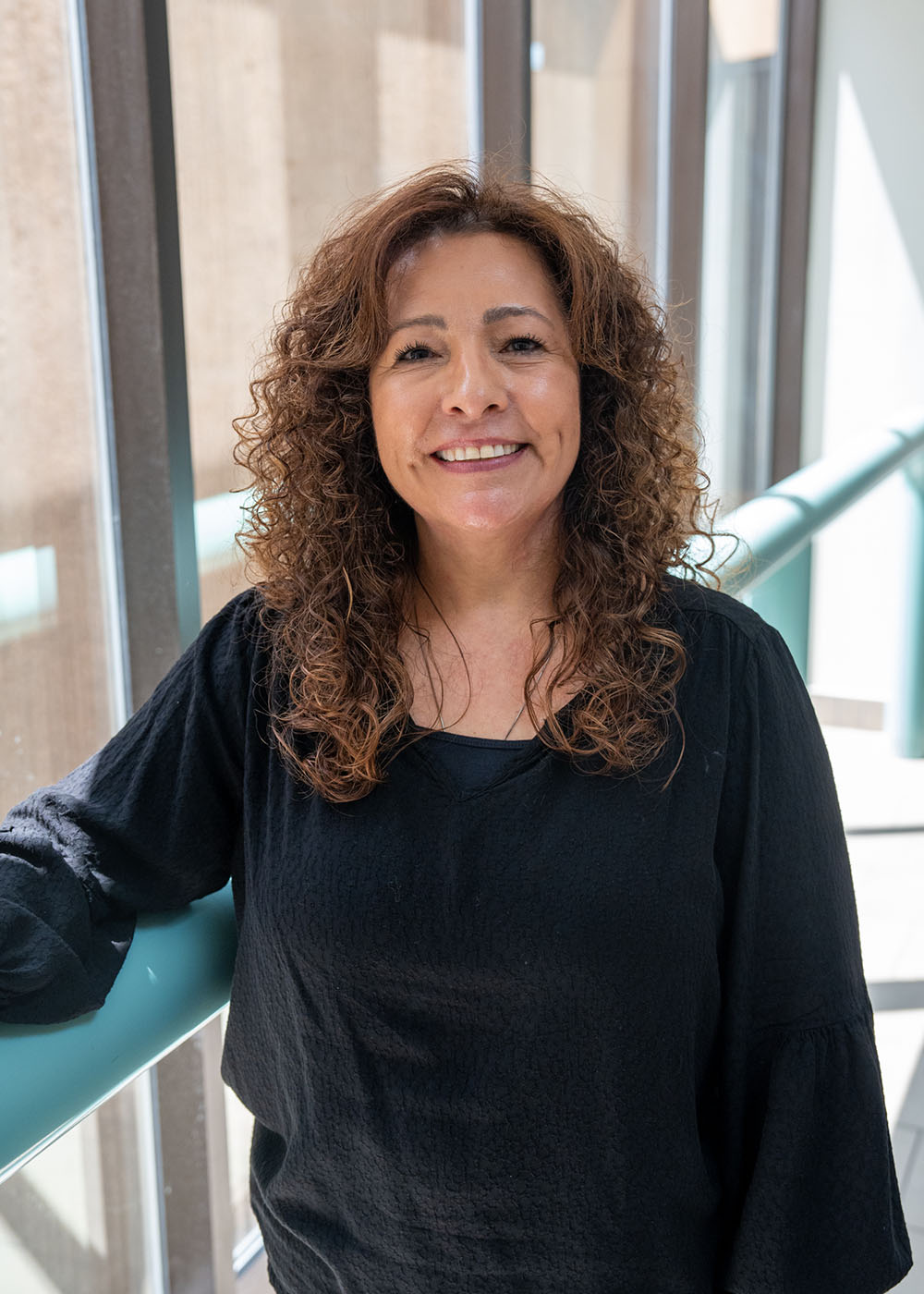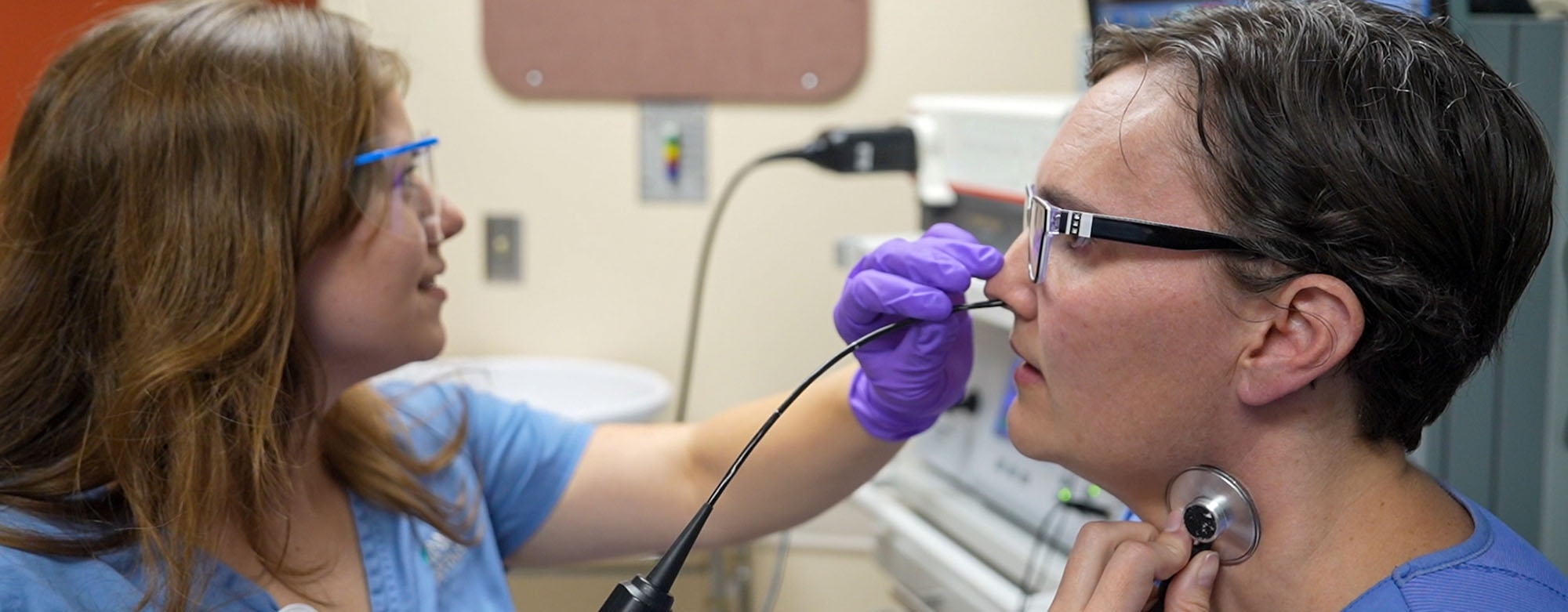Of all the careers in health care, medical speech pathology is one rich with rewards according to a speech pathologist at The University of New Mexico Hospital. Carol Romero-Clark, MS, CCC-SLP, a speech pathologist and the Director for Rehab Services, Speech Pathology and Audiology at UNM Hospital, hopes more young adults pursue an interest in the field, so that they can have the same level of job satisfaction her 30-year career has given her.
In her position as director of Speech Pathology and Audiology at UNM, Romero-Clark’s mission is to oversee the team at UNM Hospital that provides a wide range of services, treating in-patient and out-patient, as well as providing care to those in dire need. That means, she said, ensuring that the managers of the out-patient speech and audiology departments “have the tools they need to do the job.” Those tools, Romero-Clark said, are most often the people to treat those in need.
“We really work as a team, and we try to manage everything to make sure that we follow policies and procedures to make sure that we’re all in alignment,” though that mission is dependent, she said on the efforts of every team member. And those team members, Romero-Clark says, are always ready to step in when needed.
Speech and language pathologists are professionals who possess a master's or doctoral degree. They assess and treat a variety of disorders, including swallowing problems, articulation difficulties, communication disorders, aphasia and language development delays, among others. These professionals work in hospitals, private practices, school settings, nursing homes, university research departments and in private research.
Unlike many health fields, speech pathology is one that non-medical professionals know little about. And for good reason, as its aims and missions vary widely depending on the patient. Speech pathologists often work, as Romero-Clark pointed out, as part of an interdisciplinary team, interfacing with providers from other fields to best serve the patient.
Patients’ circumstances vary widely. Some are victims of car accidents or violent crime, like stab wounds to the neck, while others are suffering from cancer, including jaw, mouth, vocal tract and throat cancer. All of these can negatively impact speech and swallowing. Radiation therapy for cancer patients can also limit the ability of the patient to swallow and eat, and stroke victims, too, are often in need of the services of a speech pathologist.
The aim in every case is to assess the patient’s current needs, working closely with other health care professionals to provide the care that will best serve the patient. Sometimes, that means providing critical care to patients in the hospital, while in other cases, it means managing an out-patient’s needs as they transition to their home for care.
“When we get an order to see a patient,” Romero-Clark said, “we do a chart review and determine what we need to do. Then we go in and do a swallow evaluation.” This early assessment, she explained, is critical, especially since the risk of pneumonia is high in patients with swallowing difficulties. “We have to make sure they’re safe to swallow,” while also doing a cognitive screening, to help determine how to best help the patient with continuing care.
Speech pathologists also regularly perform instrument studies, such as a modified barium swallow test, which can clearly show the extent of the swallowing difficulty and the risk of pneumonia. In these cases, speech pathologists will work with the patient while they are in skilled care and after they return home. And these are just some of the types of care that speech pathologists provide.
“Speech pathology,” Romero-Clark said,” is one of the best professions you can ever get into.” Regardless of what area of speech pathology you go into, in the school system, in medical care or even rehabilitation, you’re going to make an impact on somebody. And that impact,” she emphasized, “is going to hold on to you for life.” Romero-Clark has stayed in touch with many of her patients even for years after their treatment, sometimes becoming a friend. When a former patient dies, often many years later, she will reflect on the improved quality of life she helped give that patient.

(This job) is so impactful. My advice (for others) is to never underestimate yourself, and never underestimate your ability to make a difference
“I think I did my job. It’s so impactful. My advice (for others) is to never underestimate yourself, and never underestimate your ability to make a difference.”
Of all the different jobs in the whole wide world, what influence pointed Romero-Clark toward her profession? It was her mother. “I was going to be an accountant,” Romero-Clark recalled, “so I took two classes and realized, ‘No, I don’t want to do this. So, I talked with my mom who said, ‘You know, there’s a job called speech pathology you might want to consider it,’ so I thought, why not? I’ll give it a shot.” So, she did. And she loved it, the proof, in addition to her obvious pride in her work is that she has been working in speech pathology, making a positive impact every day.
UNM has comprehensive programs for those seeking to become a speech-language pathologist, offering both undergraduate and master’s level programs to prepare students to become speech pathology professionals. The Bachelor of Arts in Speech and Hearing Sciences helps lay the groundwork for professionals, and the Master of Science program prepares students to become professional speech-language pathologists.
